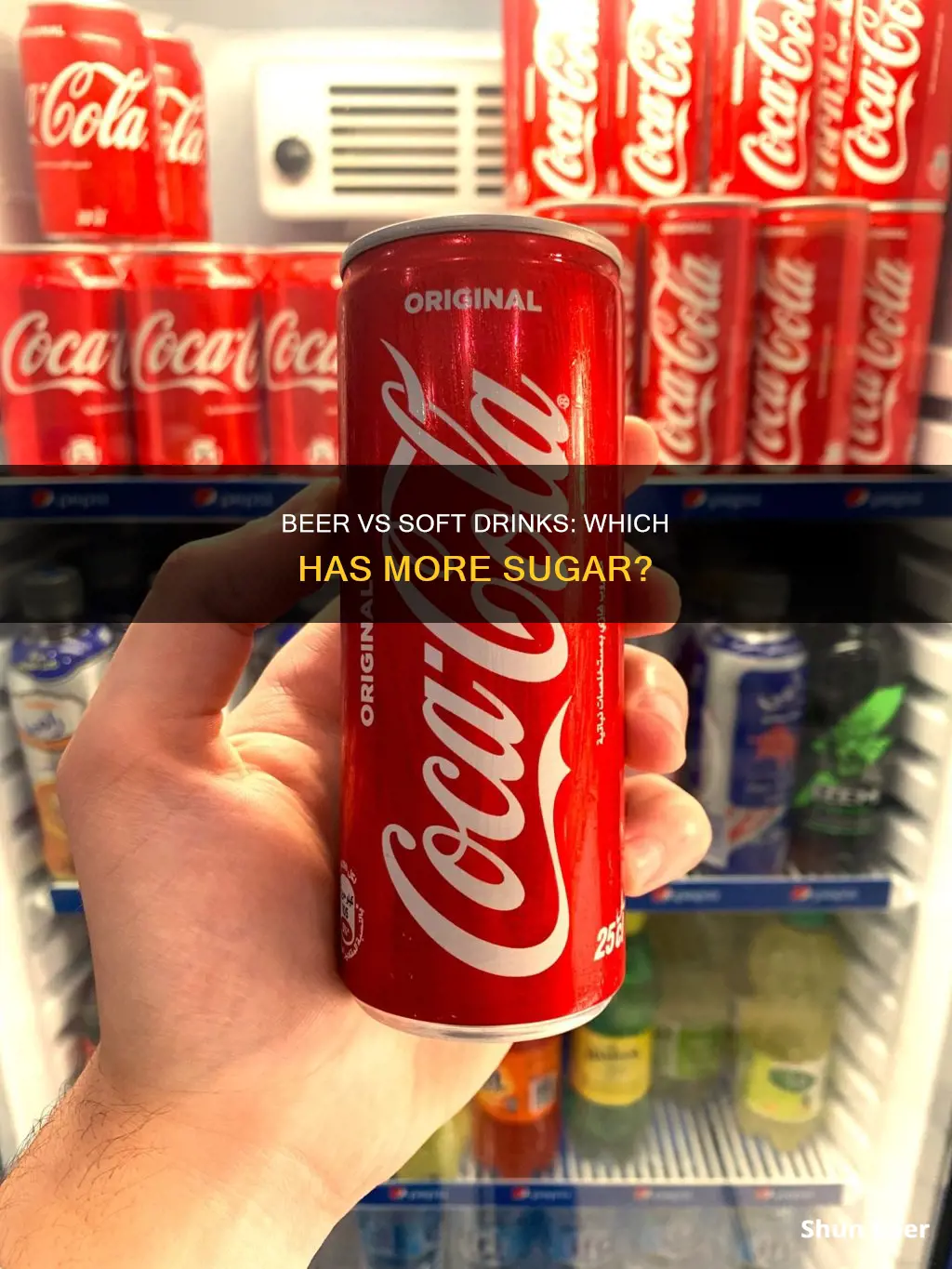
Soft drinks and beer are both packed with sugar, but which one contains more? A 12-ounce can of standard soda contains about 39 grams of sugar, which is equal to about 9 teaspoons. On the other hand, beer is fermented dry, so it has no sugar, but it does contain carbohydrates that the body turns into sugar. A regular beer has 12 grams of carbohydrates per serving, while light beer has approximately 6 grams. So, when it comes to sugar content, soft drinks contain more sugar than beer. However, it's important to note that both beverages should be consumed in moderation as excessive sugar and carbohydrate intake can lead to health issues.
What You'll Learn
- Beer has little to no sugar but is high in carbs
- Soft drinks contain around 35-45 grams of sugar per 12-ounce can
- The high sugar content in soft drinks can lead to health issues
- Beer contains natural sugars from grains used in the brewing process
- Soft drinks are acidic and can have negative effects on dental, digestive and bone health

Beer has little to no sugar but is high in carbs
Beer gets its sugar from the natural sugars found in the grains used during the brewing process. However, during fermentation, yeast consumes much of this sugar to produce alcohol, resulting in a low final sugar content.
While beer has a low sugar content, it is high in carbohydrates. Regular beer contains 12 grams of carbohydrates per serving, while light beer has about six grams. To put this into perspective, a pint of regular lager typically contains 10 to 15 grams of carbohydrates, and some stouts and porters can have upwards of 20 grams per pint.
Because of the fermentation process, beer is dry and contains no sugar. However, it is still important to consume beer in moderation because the body turns its carbohydrates into sugar.
Beer Drinking and Getting Ripped: Is It Possible?
You may want to see also

Soft drinks contain around 35-45 grams of sugar per 12-ounce can
Soft drinks are known to contain high levels of sugar. A 12-ounce can of standard soda contains about 39 grams of sugar, which is roughly equal to 9 teaspoons of sugar per can. This is significantly higher than the recommended daily sugar intake for women (25 grams) and men (36 grams) set by the American Heart Association (AHA). This means that a single can of soda can easily exceed the recommended daily sugar intake, not to mention other sources of sugar consumed throughout the day.
The high sugar content in soft drinks has been linked to various health risks. Regularly consuming high levels of added sugar can lead to an increased risk of higher blood pressure, inflammation, weight gain, diabetes, and fatty liver disease, which are all associated with a higher risk of heart attack and stroke. Additionally, the high fructose corn syrup commonly used in soft drinks is considered one of the worst forms of sugar.
While diet sodas contain little to no added sugar, they are artificially sweetened and have been linked to potential negative health effects, such as an increased risk of metabolic syndrome and cardiovascular disease.
The sugar content in soft drinks can vary depending on the brand and type of drink. Popular soft drinks like Mtn Dew, Pepsi, and Coca-Cola can contain between 39 and 46 grams of sugar per 12-ounce can. Therefore, it is important for consumers to be mindful of their sugar intake and make informed choices when it comes to their beverage consumption.
Beer Drinking: Why Some People Can Handle More
You may want to see also

The high sugar content in soft drinks can lead to health issues
Soft drinks are a leading source of added sugars in the American diet. A single can of soda can contain up to 10 teaspoons of sugar, far exceeding the recommended daily sugar intake for both men and women. Regularly consuming high levels of added sugar can lead to serious health issues.
The high sugar content in soft drinks has been linked to weight gain and obesity. Research has shown that people who consume sugary drinks do not feel as full as they would from consuming the same amount of calories from solid food. This can lead to increased caloric intake and subsequent weight gain. Studies have consistently shown a strong connection between increased consumption of soft drinks and weight gain in both children and adults.
Frequent consumption of sugary drinks is also associated with a higher risk of type 2 diabetes. The rapid increase in blood sugar levels caused by sugary drinks can lead to tiredness and increased hunger, even in individuals without diabetes. Over time, regularly elevated blood sugar levels can increase the risk of developing type 2 diabetes.
In addition to weight gain and diabetes, the high sugar content in soft drinks has been linked to other health issues such as heart disease, kidney disease, non-alcoholic liver disease, tooth decay, and gout. The high glycemic load from sugary drinks can negatively impact blood glucose, cholesterol fractions, and inflammatory factors, contributing to an increased risk of heart disease.
The sweet taste of soft drinks can also stimulate the appetite for other sweet and high-carbohydrate foods, further contributing to unhealthy dietary patterns. Additionally, the high calorie and low nutrient content of soft drinks can lead to increased energy intake without providing any nutritional benefits.
It is worth noting that diet sodas and artificially sweetened drinks are not without their risks. While they may contain fewer calories and no added sugar, they have been linked to an increased risk of metabolic syndrome and cardiovascular disease.
George Jones' Relationship with Beer Explored
You may want to see also

Beer contains natural sugars from grains used in the brewing process
The grains used in brewing, such as barley, contribute natural sugars to the beer. The malting process involves germinating and drying these grains, which converts the starches into fermentable sugars. This is an essential step in the brewing process, as the sugars are then fermented by the yeast to produce alcohol.
The amount of sugar in beer can vary depending on the type of beer and the ingredients used. For example, stouts, porters, and Guinness tend to have a higher carbohydrate content, with over 20 grams of carbohydrates per pint. On the other hand, light beers have fewer carbohydrates, with approximately 6 grams per serving.
It's important to note that while beer contains natural sugars, it is still a source of empty calories, providing energy without significant nutrients. The sugar in beer can also affect blood sugar levels, especially for individuals with diabetes. However, beer has a lower sugar content than soft drinks, which typically contain around 35 to 45 grams of sugar per 12-ounce can.
In summary, beer contains natural sugars from grains used in the brewing process, but the amount varies depending on the type of beer and ingredients. Beer has a lower sugar content than soft drinks, but it is still important to consume it in moderation as part of a balanced diet.
Drinking Beer at Encinitas Beach: What's Allowed?
You may want to see also

Soft drinks are acidic and can have negative effects on dental, digestive and bone health
While beer and soft drinks are both unhealthy, beer contains less sugar. A 12-ounce can of standard soda contains about 39 grams of sugar, which is equal to about 9 teaspoons of sugar per can. On the other hand, a standard 12-ounce serving of regular beer contains around 1 to 2 grams of sugar.
Soft drinks are highly acidic due to the presence of citric, phosphorus, and other acids. This carbonation gives sodas their fizziness, but it also increases their acidity. The pH of most sodas is between 2.5 and 4, making them significantly more acidic than water, which has a pH of around 7. The high acidity of soft drinks can have several negative effects on the body, including:
Dental Health
The acid in soft drinks can erode tooth enamel over time, leading to dental cavities and tooth sensitivity. Even sugar-free soft drinks contain acids that can harm teeth. With every sip of soda, a damaging tooth reaction is initiated, which typically lasts for around 20 minutes. This means that drinking soda throughout the day puts your dental health under continuous attack.
Digestive Health
Some people may experience acid reflux or heartburn after consuming acidic beverages like soda.
Bone Health
Excessive consumption of acidic beverages may have a negative impact on bone health over time. Studies have shown that phosphoric acid, which is present in many soft drinks, affects calcium metabolism and bone mass. To maintain healthy bones, the body needs a balanced ratio of calcium and phosphoric acid, along with other minerals and proteins. The large amounts of phosphoric acid in soft drinks cause calcium to be drawn out from bones to maintain the blood ratio. Additionally, excess soft drink acids in the stomach bind to consumed calcium, preventing its absorption. This can lead to osteoporosis, a condition that affects approximately 55% of people over 50 years of age.
Beer Drinking: Throat Damage and Health Risks
You may want to see also
Frequently asked questions
Soft drinks contain more sugar than beer. A 12-ounce can of standard soda contains about 39 grams of sugar, which is equal to about 9 teaspoons. Beer, on the other hand, contains very little sugar, with a 12-ounce serving of regular beer containing around 1 to 2 grams.
Most people find caffeine bitter, so soft drinks companies add sugar to improve the flavor.
Beer is not completely sugar-free. While it has very little sugar, it contains lots of carbohydrates, which the body turns into sugar. Therefore, beer should be consumed in moderation.
A 12-ounce can of soda typically contains between 35 and 45 grams of sugar.
Yes, almost all beverage manufacturers produce zero-sugar versions of their drinks. These are usually sweetened with artificial sweeteners such as aspartame, stevia, or acesulfame potassium.







